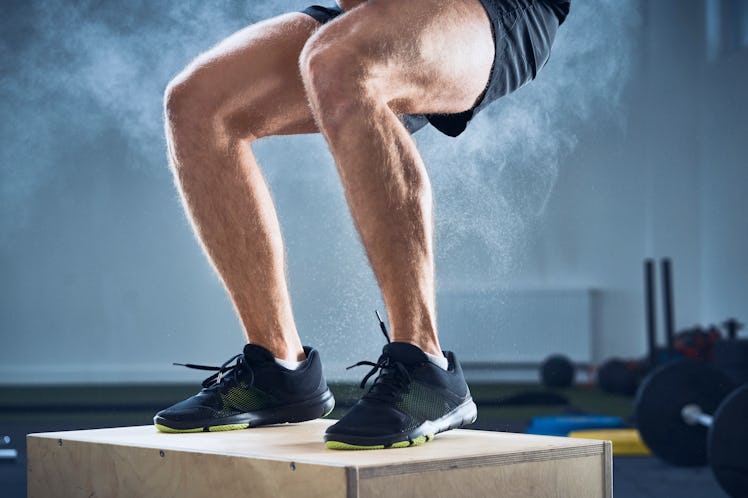What Men’s Big Calves Say About Their Health, According To Science
Leg day isn't just about vanity. Calf circumference might be an indicator of health advantages.

Scientists believe that whether a man has big calves or small calves is largely determined by genetics. But that hasn’t stopped men from doubling down on leg day. Calf implants are an increasingly common solution for insecure guys prepping for shorts season. And the anxiety around men’s calf size goes way back to the American Colonial period. Yes, the Founding Fathers were comically obsessed with getting thick, big calves, which were constantly on display thanks to their short pants.
Although the modern heirs of their anxiety (Tiger Woods allegedly has extreme hang-ups about his small calves) can rest assured that calf size isn’t a matter of life or death, it can serve as an indicator of some health markers. Health experts know a lot more about big calves than they did 250 years ago, and most of the findings aren’t great for skinny, small calves. As it turns out, the decision to skip leg day and remain small-calved might be poorly considered.
Calves Are Correlated With Overall Musculature
The size of one’s calf muscles is an indicator of muscle mass throughout the entire body, as well as adequate nutrition, research shows. The larger the calf circumference, the more appendicular muscle people had (the muscles that control the upper and lower limbs), another study found. Unless they’re implants, strong calves don’t stand alone and are symptoms of a generally buffer body.
Big Calves Mean Lower Stroke Risk
The bigger the calves, the smaller the stroke risk, a study of 6,265 people found. Regardless of age, sex, body mass index, and other vascular risk factors, those with bigger calves had fewer fatty deposits known as plaques built up in their arteries. This means they have a lower risk for stenosis, carotid artery disease, and strokes. Researchers suspect this may be because big calves give the body another place to store fat that could cause problems hanging out in the bloodstream. It’s not just muscle back there.
Big Calves Are Correlated With Liver Problems
Thick calves may lower some health risks, but they could act as a trojan horse for nonalcoholic fatty liver disease, or excessive liver lipid accumulation in people that’s not a result of alcohol abuse. Since calves act as a proxy for fat deposits, scientists found that larger calf muscle circumference was linked with more lipid build-up. The size of a person’s calves could even be used to screen for this liver condition. Ultimately, big calves are fickle beasts, but at least people with skinny calves have one thing going for them.
Big Calves Deflate Over Time
Skeletal muscles wear down with age, and calves are no exception, studies suggest. The process, known as sarcopenia, can start as early as age 40 and pick up from there, but issues are more common among seniors. Most studies on calf circumference loss have the same caveat — they focus on older people, perhaps because they experience the most shrinkage. But it’s important for dads to pay attention to their calves early on because exercise can help offset age-related muscle loss and the health problems that follow it. And if they look better in cargo shorts while doing it, so be it.
Small Calves Mean a Higher Resting Heart Rate
The smaller a person’s calves are, the higher their resting heart rate may be, according to a small study. In general, a high resting heart rate — anything above 100 beats per minute — has been linked to an increased risk of death regardless of physical fitness. However, if resting heart rates get too low, they can cause people to faint. Then even the sturdiest legs can’t keep you from falling.
Calf Muscle Check List
- Work out early and often. Exercise can help offset age-related muscle loss in calves.
- Incorporate calf raises when you walk on stairs.
- Don’t go overboard. Strong calves are great, but really big calves are a mixed bag.
- Calves correlate to heart health, risk of stroke, and overall musculature.
- Genetics plays a part in the size of one’s calves.
This article was originally published on